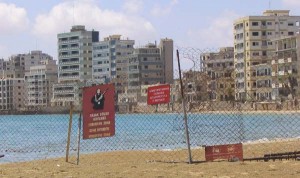This latest decision tells us nothing about Israel or the West Bank. But it tells us what we need to know about the EU.

The Ghost Town of Varosha, Famagusta Cyprus which was taken hostage by the Turkish Army in August 1974 and has been used as a bargaining counter since that date.
What about Cyprus? That is just one of the questions that Israelis and Europeans should be pondering now that the European Union has again decided that it should dictate Israeli border and security policy.
Last week the European Union issued a ban on funding of, or cooperation with, any Israeli institutions that are shown to operate in what it calls the “occupied territories” – meaning the West Bank, or Judea and Samaria. Never mind that — as Palestinian groups have already admitted — the ban will affect Palestinians as much as Israelis. In its perpetual rush to find new double-standards to enforce, the EU has rushed straight in, regardless.
As one senior Palestinian Authority official said on the announcement of the news, many Palestinians in Ramallah and elsewhere will be just as affected by the EU’s decision as their Israeli neighbors. The senior PA official was quoted saying:
“For our part, we approached a number of [European] Union officials, in the [Palestinian] Authority and also in Israel, to try and prevent the decision or at least to keep it unofficial,” said the official, who declined to give his name. “It’s not just Israeli companies that are going to be hit economically, it’s also going to be disastrous economically and socially for the Palestinian community.”
Well what are a few Palestinians to the EU’s persistent drive to isolate the Jewish state? Tolerable collateral damage, surely?
But what about Cyprus? After all, there are many countries in the world with border disputes. There is at least one major one on China’s borders [Tibet]. And there is the rather famous one which borders Pakistan [Kashmir]. Border disputes are hardly unusual. Similar stories abound all over the world, such as the unresolved dispute involving Morocco over the status of the Western Sahara. Yet all these countries are ones with which the EU has full, if not fawning, diplomatic and trade relations.
Of course, what makes the EU’s latest double-standard even more delicious is that the occupied island of Cyprus is actually a member of the EU. As such, shouldn’t it surely command the most detailed and persistent attention from the international body?
Yet this is not so. The northern part of Cyprus has been illegally annexed for the last four decades by Turkey. It is not as though Turkey shares a border with the island. Nor does it have — as Israel has with the West Bank — any legitimate historical, political or other territorial claims on the northern part of the island. There is no security reason for Turkey to sustain its occupation, as there is an obvious need for Israel to have defensible borders that do not permit terrorists from the West Bank to fire rockets into Israel, as do its friends in post-disengagement Gaza or southern Lebanon.
But unlike Israel and the West Bank, the Turkish invasion of Cyprus is not even a disputed matter. It was certainly not some understandable territorial gain made after aggressive war waged by Greece. It was outright theft — an annexation: state terrorism. The entire international community recognizes it as such. Yet in 2013 not only is Turkey not an enemy of the EU, and not only is it a country which enjoys complete diplomatic and trade relations with the EU, it is a country which many leading members and officials of the EU actually want to promote into a full member-state of the EU.
Into the fifth decade of Turkish occupation of Cyprus, there is still no serious dictating by the EU to Turkey over what it must do about northern Cyprus. Turkey does not find itself under even the most remote international pressure finally to disengage from its illegal occupation of the northern part of Cyprus. And that is because for some inexplicable reason the EU does not consider it imperative that Turkey should disengage from the illegal occupation of an EU member state. It does not consider that the future of any region depends on this action. Yet it does persist, even now, with its view that it can dictate to Israel about its borders. And that it can have a constructive role in doing so. Of all the fallacies of the EU, that is surely the topmost.
The EU does not only have a wrong-headed view of Israel’s past, it has a wholly misguided view of its future.
Today Israel is at the very bottom of the list of countries of concern, even in its own neighborhood, let alone the wider world, with nearly 100,000 dead in Syria and Egypt going through a counter-counter revolution, and with the Sunni-Shiite conflict looking likely to reach one of its intermittent boiling points as the Shiite armies of Hezbollah clash with the Sunni-armed opposition in Syria. Amid all this, the issue of where Jews should or should not live inside their historical homeland is a matter of the lowest international import.
Yet the EU — which always likes to think of itself as such a forward-looking organization — is once again showing itself to be stuck in a wrong-headed and bigoted past. It is not Israel which is the problem in the Middle East. Today Israel is, in fact, about the only non-problem in the region.
Yet it is this country’s sovereignty upon which the EU decides time and time again that it can intrude. This latest decision tells us nothing about Israel or the West Bank. But it tells us what we need to know about the EU.
[youtube xcfBJ7DimB8 nolink]









